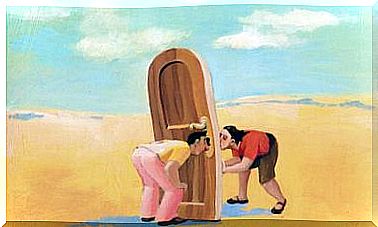The Impact Of A Stressful World

Much has been said about stress and its devastating health consequences. We are all familiar with the term and many people still associate it with the image of someone who is overwhelmed, in a hurry, and a little erratic. However, the data tells us that many people live in a state of constant stress and are unaware of it. Unfortunately, we live in a stressful world ruled by the clock.
Creating and adapting to a pace of life that meets our own expectations or those of others does not mean being stress free. Unfortunately, we have stressful experiences every day, making this anxiety part of our routine.
Today we want to talk about the most relevant factors that make this world a stressful world. We must know how to recognize them and act against them. The fact that our lives seem normal to us prevents us from seeing the consequences of what we normalize. We gradually fill the glass that contains us, “waiting” for the last drop to explode to take action.

Brain poisoning from a stressful world
There are mild stress levels that help us improve our cognitive abilities (eustress ). The release of adrenaline activates the nerve pathways that allow us to concentrate better. It’s magical stress. There is no life without a minimum of stress.
But there is a line, either by intensity, frequency or prolongation in time, which, once crossed, causes the whole process to turn against us.
The same chemical mixture that allows us to focus better on a task can also put us in a situation of anxiety and even panic. The adrenaline that we release in situations that make us alert, in its true measure, is necessary.
When you increase the dose, the body reacts badly. It increases the flow of testosterone, which increases our expectations. If you are a woman, oxytocin makes its appearance and prompts you to protect those around you. Another stressor is then added to the situation.
Cortisol released as a counterpoint to excess adrenaline can be toxic to the hippocampus. All of this contributes to a domino effect that can lead to serious chronic health issues, from autoimmune issues to diabetes. Being immersed in high stress levels also prevents us from making healthy connections with others.
The vagus nerve and our stressful world
When we go through times of great stress, the sympathetic nervous system is working at full speed. The people around us can be great allies in the fight against this excess stress.
However, in a stressful world like the one we live in, sometimes we have to deal with factors like competitiveness and many more that we will see later. They easily make us lose this protective support against stress.
The support we receive results in inhibitory signals that pass through the vagus nerve to reach the sympathetic nervous system. When we interact with other people who make us feel secure, we reduce the state of high and constant arousal.
We live in a culture that constantly undermines our pathways of connection. In addition, we do not always have the possibility to change our living conditions. This is why it is essential to find ways to balance the response to excessive stress.
The first step is to recognize the circumstances
In this stressful world, many factors leave us at the mercy of this chemical cocktail. Let us first examine those which appear to us the most clear. Others are less so, because we usually don’t associate them with stressors.
The most easily recognized are stressors at work. Studies show that over 70% of the population suffers from stress in the workplace. Personal appearance is also one of the top stressors in studies.
It may seem superficial at first glance, but it is not. Our physical appearance is directly related to our self-confidence and self-esteem. Another factor that we are not really aware of is the social stress we experience every day.
In this stressful world, absurd arguments over political issues, the media bombardment of creating public opinion, and the inertia we experience in trying to understand an often inexplicable world have a strong impact on our state of alert.

Major circumstances
In addition to all of the above, sooner or later we will have to deal with events that challenge our ability to deal with stress. The loss of a loved one is a major stressor which, depending on the circumstances, can even lead to post-traumatic stress disorder.
Losing a loved one under very tragic circumstances can come as a severe shock to reality. Beginning to understand that these things are happening and will continue to happen to those around us can generate high levels of stress in anticipation.
Likewise, financial concerns related to job loss or just the situation we are going through as a society right now are other sources of stress. The fear of not being able to pay the bills or reaching retirement age without having contributed enough years is another source of risk to our health.
Identify personal causes and take action
What for some can be a mental escape or a source of peace, like family reunions, for others can be a real nightmare. Stress is absolutely subjective and relative to each person’s personality.
Shopping can be a balm for many people and for others it can be a stressful and over-stimulating environment. Within the couple, it is very important to understand this. We should not extend our own demands for peace of mind to those around us.
Without a doubt, whether stress has been identified or not, it is advisable to follow a stress prevention or reduction program. There are many relatively simple ways to combat it. From practicing meditation to practicing regular exercise.
Not all systems work for everyone, so it’s important to find yours and exercise it. We live in a stressful world, that’s for sure. But this is the world we live in, and it’s easier to take care of it than to try to change it.










